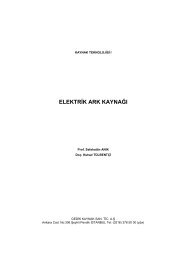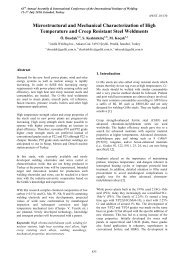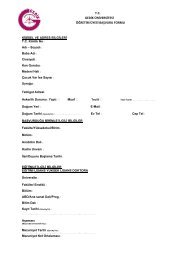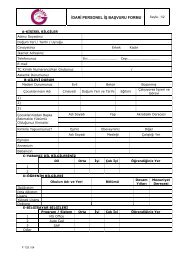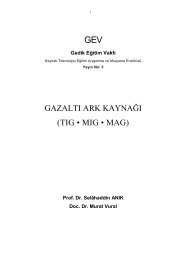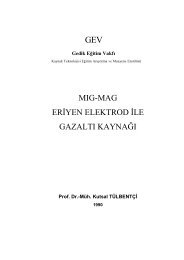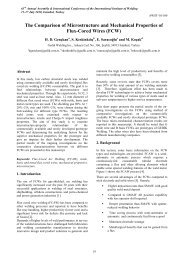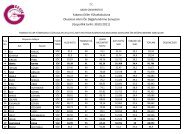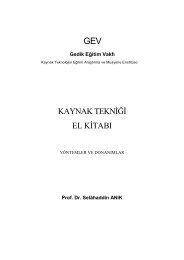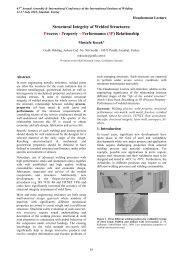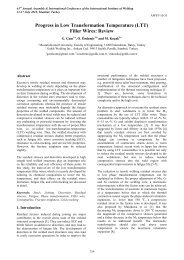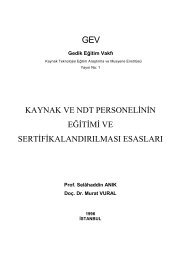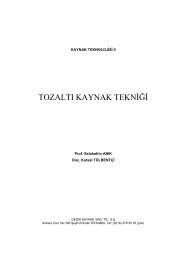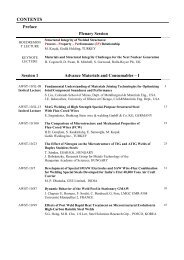Improving Global Quality of Life
Improving Global Quality of Life
Improving Global Quality of Life
Create successful ePaper yourself
Turn your PDF publications into a flip-book with our unique Google optimized e-Paper software.
7 Needs and challenges in legal codes, rules and standardisation<br />
by a few countries – so that today, despite the huge increase in PE numbers, pressure and sizes, the number<br />
<strong>of</strong> failures and fatalities has been greatly reduced. Welding technology has helped this improvement.<br />
Figure 7.1 also shows a similar trend with motor vehicles a 100 years later – where obviously many different<br />
strategies including laws, technology and standards have been effective in reducing fatalities. Another<br />
example is with welded shipping where a similar trend curve resulted. There were many failures due to<br />
brittle fracture in World War II but now these are fairly rare.<br />
In the above examples and in many other areas, improved technology (including improved understanding,<br />
design, materials, welding, non-destructive testing, inspection, R&D and technical data) plus standards and<br />
laws, coupled with huge improvements in education, training etc., have benefited global quality <strong>of</strong> life,<br />
though regional inequalities still exist. All countries still have serious failures however – much less frequently<br />
but <strong>of</strong>ten with major multi-billion dollar consequences. Thus the world still needs to do better and IIW is<br />
helping.<br />
7.3 Current position with laws, standards and technical knowledge<br />
7.3.1 Laws<br />
In most countries, Acts, Regulations, Directives, and other government orders impact on the “welding<br />
industry” in many varying ways. These include workplace health and safety, environment, safety with<br />
hazardous plant and materials, piping, pipelines, boilers, pressure vessels, gas cylinders, transport equipment,<br />
cranes, lifts, structures, tanks, major hazard facilities, defence, security etc. They also impact on trade within<br />
and between countries (free, fair and with minimum protection to suit each country), industrial relations,<br />
wages, education and training, taxation, immigration and suitable support for industry, research, education etc.<br />
Laws are needed for us to live reasonably and cooperatively, and have been a major contributor to improved<br />
national safety and well-being.<br />
All successes and failure are due almost invariably to human endeavour. Hence actions and functions involving<br />
people need to be clearly identified. Laws may go so far without being specific while standards in some cases<br />
may not be able to fill the gap. This is where help and guidance may be needed from industry bodies such as<br />
welding institutes. The biggest gains can be with improved understanding, use, and performance <strong>of</strong> people.<br />
The current trend with laws on technical issues is to reduce “prescriptive” requirements which inhibit<br />
innovation and prefer “performance” laws which give objectives, matters to be considered, general criteria<br />
and performance requirements or outcomes, plus duties <strong>of</strong> important parties and administrative matters.<br />
There is a reluctance to be highly specific in technical issues because <strong>of</strong> the complexity for politicians and<br />
the wide and changing nature <strong>of</strong> technology. To help apply the law, competent bodies within or outside<br />
government are sometimes identified – a good example is the European Union Pressure Equipment Directive.<br />
Technical guidance and support is <strong>of</strong>ten given by reference to acceptable national or international standards.<br />
7.3.2 Standards<br />
There are thousands <strong>of</strong> international, regional, national, industry and company standards which are <strong>of</strong>ten<br />
far from harmonised. They are the distillation and repository <strong>of</strong> best thinking and consensus aimed to<br />
help all parties; industry, law and society, and assist in fair economic manufacture and use <strong>of</strong>, and trade in<br />
quality equipment. Sometimes they are used as trade barriers, but overall have greatly benefited the world.<br />
All leading countries have a variety <strong>of</strong> standards relating to the welding industry with a general trend to<br />
harmonised ISO Standards for global use. IIW and its members have contributed significantly in this process.<br />
Through Optimum Use and Innovation <strong>of</strong> Welding and Joining Technologies<br />
<strong>Improving</strong> <strong>Global</strong> <strong>Quality</strong> <strong>of</strong> <strong>Life</strong><br />
63



